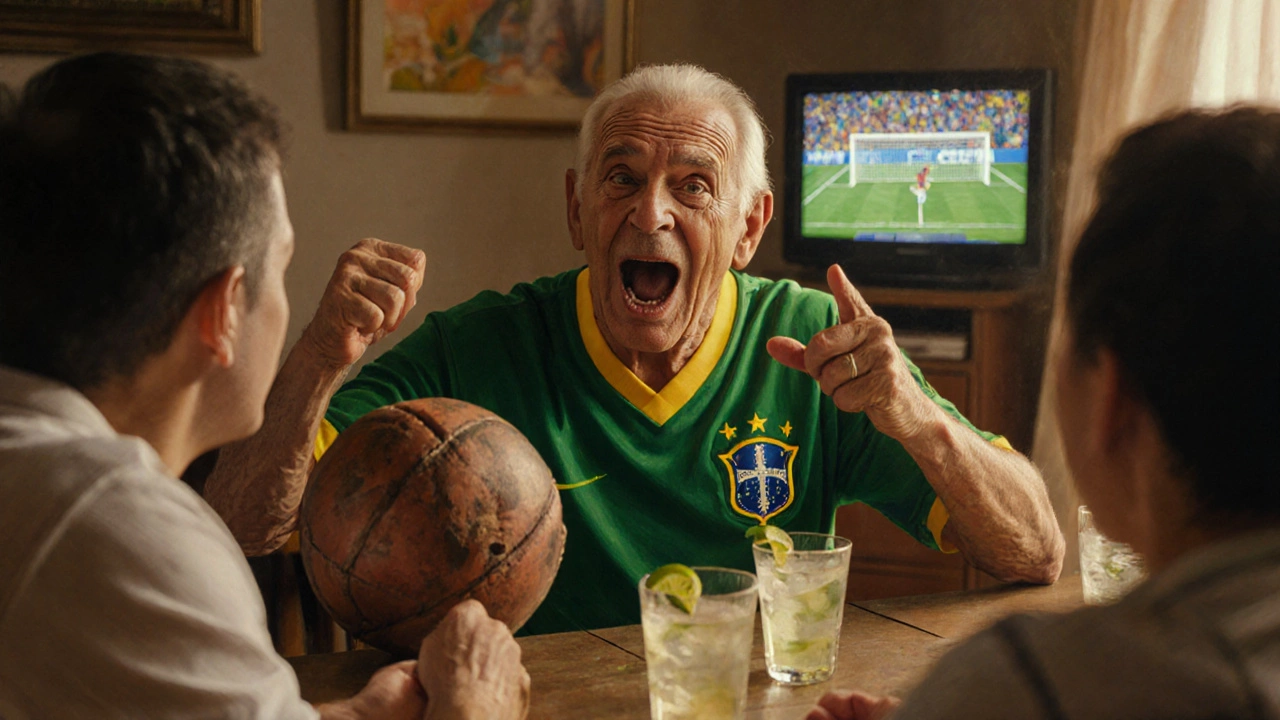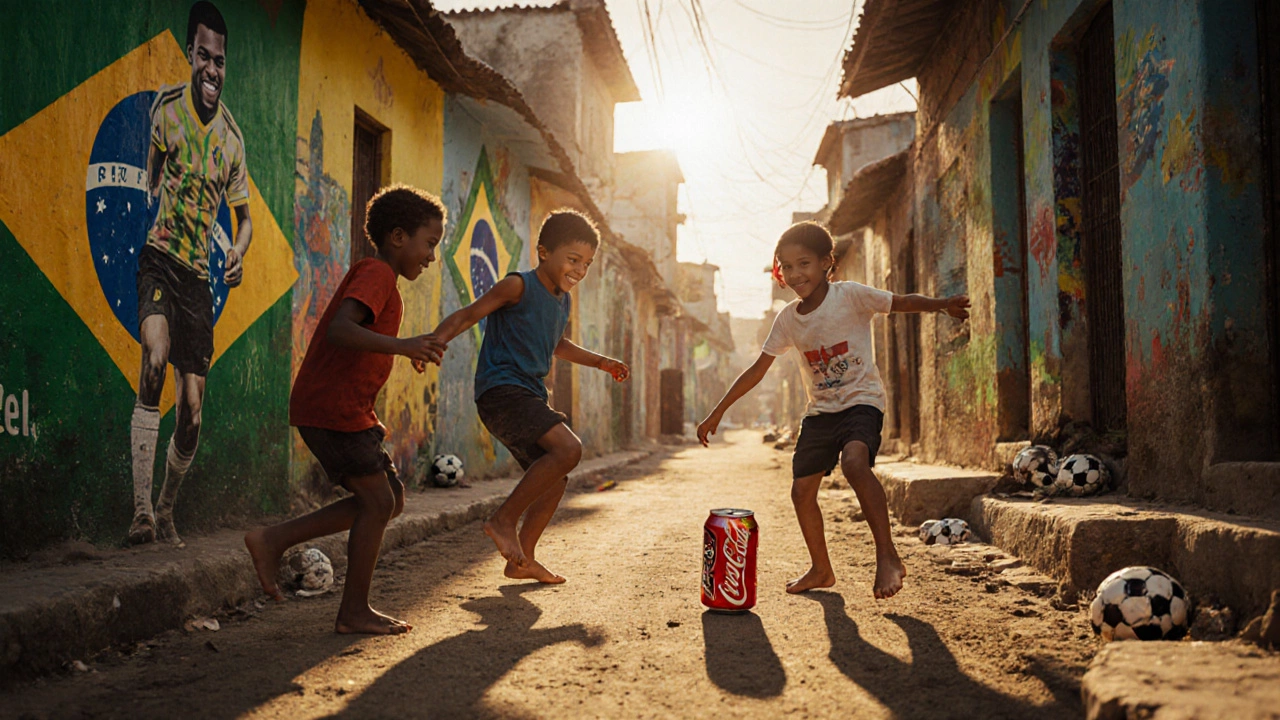Ask a Brazilian what they call the game everyone in the world knows as soccer, and they won’t say "soccer." They won’t even say "football." They’ll say futebol-pronounced foo-tay-BOL-with the stress on the last syllable and a crisp, rolling R. It’s not just a word. It’s a heartbeat. A national identity wrapped in green and yellow.
There’s no confusion here. In Brazil, futebol isn’t just the most popular sport-it’s the closest thing the country has to a religion. Streets turn into pitches after school. Grandparents argue tactics over caipirinhas. Kids kick soda cans through alleyways, dreaming of Pelé. The word "futebol" carries more weight than any trophy. It’s tied to history, pride, and a culture that turns every match into a ritual.
Why "futebol" and not "football"?
The term comes from English, but it didn’t stay English. British sailors and workers brought the game to Brazil in the late 1800s. Charles Miller, a Brazilian of English descent, brought the first footballs and rules back from England in 1894. He started the first official match in São Paulo. The locals didn’t adopt "football" as-is. They adapted it to Portuguese phonetics. "Football" became "futebol," following the pattern of other borrowed words like "cachorro" (from "dog") or "gol" (from "goal").
Portuguese doesn’t have the "th" sound, so "foot" became "fute." The "ball" part turned into "bol," a common ending in Portuguese for objects. Think "basquete" for basketball, "vôlei" for volleyball. The language reshaped the word to fit its rhythm. That’s how futebol was born-not as a translation, but as an evolution.
"Football" is used in Brazil too-but not for soccer
If you hear someone in Brazil say "football," they’re probably talking about American football. The sport with helmets, pads, and downs. It’s growing slowly, especially in cities like São Paulo and Rio, where expat communities and international schools have introduced it. But when a Brazilian says "football," they’re not referring to what Americans call soccer. They mean the NFL-style game. Context matters.
That’s why you’ll never see a Brazilian news headline say "Brasil vence o football." It’ll say "Brasil vence o futebol." Or better yet, "Brasil vence a seleção." The team is the real star. The name of the game? Futebol. Always.

How deep does the word go?
Futebol isn’t just a word you say before a match. It’s in the slang, the music, the movies, the jokes. People don’t "play soccer." They "jogam futebol." A good player is "um craque de futebol." A bad referee? "Um juiz de futebol que não entende nada." Even the Brazilian national team is called "A Seleção," but fans will say, "Vamos torcer pelo futebol brasileiro."
There’s even a Brazilian saying: "No futebol, tudo pode acontecer." In soccer, anything can happen. It’s not just about the game-it’s about hope. That’s why futebol isn’t just a noun. It’s a verb. A feeling. A way of life.
Is "soccer" ever used in Brazil?
Only if you’re talking to someone who’s spent a lot of time in the U.S. or the U.K. Most Brazilians have heard the word "soccer," but they use it like they’d use "internet"-as a foreign term, not their own. You’ll hear it in international hotels, tourist areas, or in English classes. But in a local bar, at a beach match, or on a radio broadcast? You’ll hear futebol. Every time.
Even Brazilian media that broadcasts in English for global audiences still uses "futebol" in subtitles and headlines. It’s a brand. A cultural marker. The FIFA World Cup? In Brazil, it’s "Copa do Mundo de Futebol." Not "Soccer."

What about other countries in Latin America?
Across Spanish-speaking Latin America, the game is called "fútbol." Same root, same pronunciation shift. Mexico, Argentina, Colombia-they all say "fútbol." The only major exception is the United States and Canada, where "soccer" stuck to avoid confusion with American football.
So if you’re traveling through Latin America, you’ll hear "futebol" in Brazil, "fútbol" in Argentina, and "fútbol" in Chile. The word is a linguistic thread connecting the region. It’s not just about the sport-it’s about shared history, colonial language roots, and cultural identity.
Why this matters beyond language
Language shapes how we see the world. When Brazilians say "futebol," they’re not just naming a game. They’re invoking centuries of tradition, street culture, and national pride. The word carries the sound of drumming in Rio’s favelas during the World Cup. It carries the voice of a father teaching his son how to dribble. It carries the tears of a nation after a loss-and the wild celebration after a goal in extra time.
Calling it "soccer" in Brazil isn’t wrong. But it’s incomplete. It misses the soul. The rhythm. The poetry.
If you want to understand Brazil, you don’t just need to know the rules of the game. You need to know the word. Futebol. Not soccer. Not football. Futebol.
Why do Brazilians call soccer "futebol"?
Brazilians call soccer "futebol" because the word comes from the English "football," adapted into Portuguese phonetics. The "foot" became "fute" and "ball" became "bol," following how Portuguese transforms foreign words. It’s not a direct translation-it’s a cultural reshaping of the term to fit the language’s rhythm and sound.
Do Brazilians ever say "soccer"?
Brazilians rarely say "soccer" in everyday conversation. They might recognize it if they’ve lived in the U.S. or studied English, but they use "futebol" in all local contexts-TV, radio, street talk, and media. "Soccer" is seen as a foreign term, not their own.
Is "football" the same as "futebol" in Brazil?
No. In Brazil, "football" usually refers to American football-the sport with helmets and tackles. When Brazilians talk about the global game, they always say "futebol." Using "football" for soccer will cause confusion, especially in casual conversation.
Do other Latin American countries say "futebol" too?
Most Spanish-speaking countries say "fútbol," which is the Spanish version of the same word. So while Brazil uses Portuguese "futebol," Argentina, Mexico, and Colombia use "fútbol." The pronunciation differs slightly, but the origin and meaning are the same. It’s a shared linguistic heritage across Latin America.
Why is "futebol" more than just a word in Brazil?
"Futebol" in Brazil carries deep cultural meaning. It’s tied to identity, emotion, and community. From street games in favelas to World Cup victories, the word represents hope, pride, and unity. It’s not just a sport-it’s a national obsession that shapes music, art, and daily life. Saying "futebol" is like saying "home."
